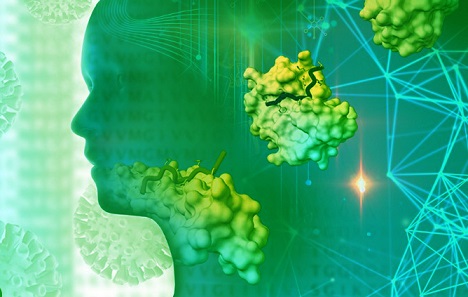COVID-19 Causes Upregulation of Vimentin Expression and Reduced N-Cadherin Expression
Nikhil Prasad Fact checked by:Thailand Medical News Team Nov 27, 2024 4 months, 3 weeks, 2 days, 9 hours, 50 minutes ago
Medical News: A Groundbreaking Study on COVID-19’s Cellular Impact
Researchers from Tokat Gaziosmanpasa University and Yozgat City Hospital in Turkey have made a significant discovery about how COVID-19 affects our cells. This study uncovers how the SARS-CoV-2 virus, responsible for COVID-19, leads to major changes in proteins associated with cell structure and function - specifically, vimentin and N-cadherin. These changes could explain some of the severe complications seen in COVID-19 patients, including multi-organ failure and long-term health issues.
 COVID-19 Causes Upregulation of Vimentin Expression and Reduced N-Cadherin Expression
COVID-19 Causes Upregulation of Vimentin Expression and Reduced N-Cadherin Expression
The findings offer insights into the virus’s impact on endothelial cells, which line blood vessels and are critical for organ health. This
Medical News report sheds light on how the virus triggers biological processes leading to tissue damage, paving the way for potential new treatments and diagnostic tools.
What Did the Researchers Investigate?
The team aimed to understand the relationship between two important proteins - vimentin and N-cadherin - in severe COVID-19 cases, recovered patients, and healthy individuals. Vimentin plays a key role in maintaining cell structure and transmitting signals within cells, while N-cadherin is crucial for cell adhesion and tissue integrity. Both proteins are vital for the endothelial-to-mesenchymal transition (EndMT), a process that can lead to fibrosis or scarring in tissues.
Blood samples were collected from 66 participants divided into three groups: 22 severe COVID-19 patients, 22 recovered individuals (6–12 months post-infection), and 22 healthy controls. Advanced techniques like ELISA and qRT-PCR were used to measure protein levels and gene expression. Clinical data, such as levels of C-reactive protein (CRP) and lactate dehydrogenase (LDH), were also analyzed to correlate with the findings.
Key Findings of the Study
The study revealed some startling results about how COVID-19 disrupts cellular processes:
-Increased Vimentin Expression
Severe COVID-19 patients exhibited significantly higher serum levels and gene expression of vimentin compared to healthy individuals. This upregulation persisted even in those who had recovered months earlier, suggesting long-lasting effects.
-Decreased N-Cadherin Levels
In contrast, N-cadherin levels were notably reduced in severe COVID-19 patients and remained low during the recovery phase. This reduction could weaken cell-to-cell adhesion, making tissues more vulnerable to damage.
-Correlation with Clinical Markers
The researchers found strong associations between vimentin levels and markers of inflammation and organ damage, such as CRP and LDH. Elevated vimentin levels also correlated with lower lymphocyte counts, a hallmark of severe COVID-19.
ong>-Diagnostic Potential
The study highlighted the potential of vimentin and N-cadherin as diagnostic biomarkers. The team performed ROC curve analysis, identifying specific thresholds for these proteins to distinguish between severe COVID-19 cases and healthy individuals with high sensitivity and specificity.
What Does This Mean for COVID-19 Patients?
The findings indicate that COVID-19 not only causes respiratory symptoms but also induces profound cellular changes that may lead to long-term health issues. Increased vimentin and decreased N-cadherin levels could be key drivers of tissue damage and fibrosis. This could explain why some patients suffer from prolonged symptoms, such as organ dysfunction and fatigue, even months after recovering from the acute phase.
Implications for Future Research and Treatments
This research emphasizes the need for targeted therapies that can address the underlying cellular changes caused by SARS-CoV-2. By modulating vimentin and N-cadherin levels, it may be possible to prevent or reduce tissue damage in severe COVID-19 cases. Additionally, these proteins could serve as valuable biomarkers to identify patients at higher risk of complications, allowing for earlier and more personalized interventions.
Conclusion
In conclusion, the study findings demonstrate how COVID-19 significantly disrupts cellular processes, leading to increased vimentin expression and reduced N-cadherin levels. These findings provide a deeper understanding of the disease’s impact on the body and open new avenues for treatment and diagnosis.
By highlighting the long-term effects on endothelial function, this research underscores the importance of continued monitoring and care for COVID-19 survivors. Future studies should further explore the therapeutic potential of targeting vimentin and N-cadherin to mitigate the disease's impact.
The study findings were published in the peer-reviewed journal: Scientific Reports.
https://www.nature.com/articles/s41598-024-72192-7
For the latest COVID-19 News, keep on logging to Thailand Medical News.
Read Also:
https://www.thailandmedical.news/news/breaking-boston-university-discovers-that-vascular-protein-vimentin-assists-sars-cov-2-access-into-cells,-contributing-to-vascular-complications
https://www.thailandmedical.news/news/breaking-french-scientists-from-aix-marseille-university-discover-that-vimentin-is-a-critical-ace2-co-receptor-for-sars-cov-2-in-epithelial-cells
https://www.thailandmedical.news/news/covid-19-news-uk-study-finds-that-salivary-iga-and-vimentin-determines-degree-of-sars-cov-2-infectivity
https://www.thailandmedical.news/news/breaking-irish-study-shows-that-integrins-could-be-receptors-for-sars-cov-2-and-integrin-signaling-upon-infection-leads-to-vascular-dysregulation
https://www.thailandmedical.news/news/french-study-provides-molecular-insights-into-endothelial-dysfunction-in-sars-cov-2-infection-and-long-covid-role-of-ace2-mediated-ve-cadherin-cleav
